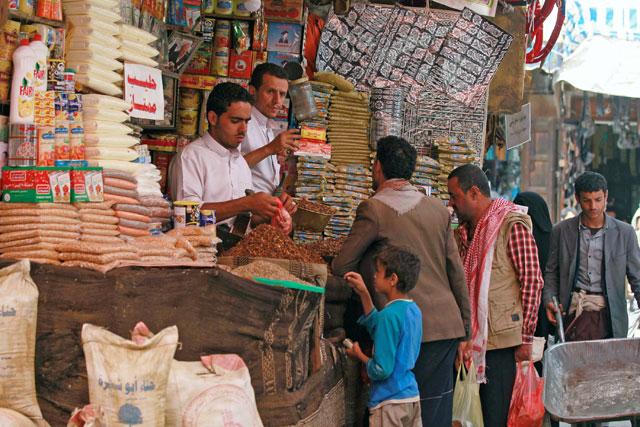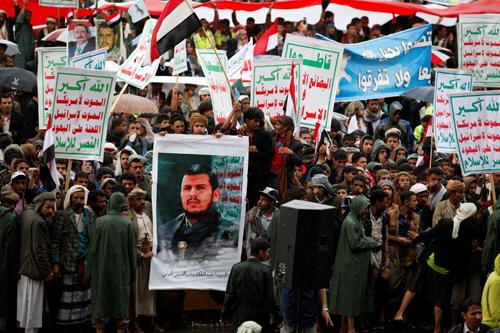You are here
Yemen foes discuss key issues in direct talks — UN
By AFP - May 05,2016 - Last updated at May 05,2016

Yemenis shop at a market in the old city of the capital Sanaa on Thursday (AFP photo)
KUWAIT CITY — Yemen foes discussed major political and security issues on Thursday in face-to-face negotiations aimed at bringing an end to 13 months of devastating war, the UN envoy said.
Three joint working groups formed by the United Nations exchanged views on resolving the political and security issues, and the release of prisoners and detainees, said the envoy, Ismail Ould Cheikh Ahmed.
The teams were formed from members of the warring delegations on Wednesday when direct talks resumed following a three-day interruption after the government delegation walked out in protest against the seizure of an army camp by the rebels.
The talks were entering their third week on Thursday, but there has yet to be a breakthrough with delegations trading accusations of violating the ceasefire that took effect on April 11.
"We have learned that ceasefire violations were committed in the past two days and this is a disturbing development," Ould Cheikh Ahmed told a news conference.
The UN special envoy urged those involved in the negotiators not to allow the ceasefire violations to impact the ongoing peace talks.
He said a joint UN-sponsored ceasefire monitoring committee had been asked to investigate clashes on the ground and submit detailed reports.
Earlier on Thursday, the head of the Yemeni government delegation, Foreign Minister Abdulmalek Al Mikhlafi, demanded action from UN mediators over rebel shelling of besieged third city Taez.
Mikhlafi said his negotiators had submitted proposals to the UN envoy for implementing an April 11 ceasefire in Taez, where loyalist troops have been under rebel siege for months, trapping tens of thousands of civilians.
But rebel spokesman Mohammed Abdessalam said it was the government that was responsible for the flare-up in Taez.
“The forces of aggression are blocking political discussions in Kuwait... by invoking false pretexts alongside a serious escalation,” Abdessalam tweeted.
Taez lies on one of the fault lines of the conflict that has raged since March last year between the rebels and the government and its allies in a Saudi-led military coalition.
The city was part of north Yemen before the unification of the country in 1990 but, unlike the capital and the northern mountains where the Huthi Shiite rebels have their main support base, it is overwhelmingly Sunni.
Mikhlafi warned that rebel shelling of Taez would “have serious consequences on the peace process”, unless the international community honours its undertakings to shore up the fragile ceasefire.
There has been mounting international pressure to end the conflict that has killed more than 6,400 people and displaced 2.8 million since March last year.
The hard-won talks opened in Kuwait on April 21 but the first round of face-to-face negotiations was held only on Saturday.
Related Articles
Kuwait City — The UN envoy has met delegates of Yemen’s warring parties separately in a bid to restart peace negotiations after a protest wa
KUWAIT CITY — Yemen’s government delegation to peace talks were leaving Kuwait on Monday after the rebel side rejected a draft peace plan pr
KUWAIT CITY — Yemen's warring parties resumed face-to-face talks on Monday following a two-day interruption after mediation efforts and an a

















